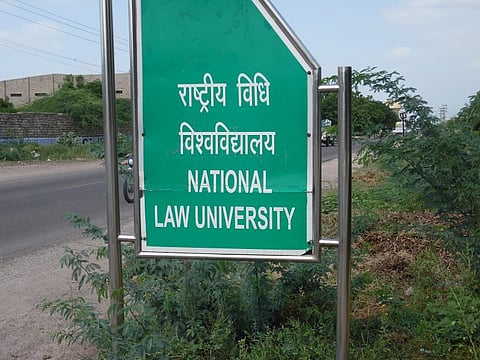
- Latest Legal News
- News
- Dealstreet
- Viewpoint
- Columns
- Interviews
- Law School
- Legal Jobs
- हिंदी
- ಕನ್ನಡ

If a recent proposal of the West Bengal government goes through, the annual intake of NUJS Kolkata might just increase almost twofold. As reported by Legally India, the suggestion was put forth in a meeting of the University’s Executive Council held on Saturday.
The report states that the West Bengal government has proposed the opening of two more law schools under the NUJS aegis in Siliguri and Asansol, thereby increasing the intake from 127 at present, to 250 students a year. The proposal has now been tabled for the next Executive Council meeting on November 12.
Though Vice-Chancellor Prof Ishwara Bhat, whose tenure was recently extended, confirmed the existence of the proposal to Bar & Bench, he said that the new NUJS offshoots are not likely to come into existence anytime soon.
“It is just a proposal as of now. The Academic Council has to meet and decide on the feasibility of opening of two new colleges. I cannot say how long it will take to come up with a decision.”
Regardless of whether or not the move comes to fruition, it is another example of the role played by state governments in influencing the affairs of a national law university. Just a year ago, NUJS introduced a quota for students domiciled in West Bengal, ostensibly in exchange for 3000 square meters of land for the purpose of building a girls hostel.
As NLU Jodhpur Vice-Chancellor Poonam Saxena reveals, asking for state government funding comes with the risk of foregoing a part of the institution’s autonomy.
And more often than not, the price to be paid by the NLUs is to increase domiciliary reservations. One can gauge which NLUs receive assistance from the state government, on perusal of the annual intake of the CLAT universities.
Only four of the CLAT NLUs – NLSIU Bangalore, NLU Jodhpur, NLU Orissa, and MNLU Mumbai – have zero seats reserved for students domiciled in their respective states.
On the other hand, some universities like DSNLU Visakhapatnam had up to 90% of the total number of seats reserved for state domicile students, until recently. As many as five other NLUs have half of their seats reserved for the locals; they are HNLU Raipur, RMLNLU Lucknow, CNLU Patna, NUSRL Ranchi, and TNNLS Tiruchirappalli.
What’s worse is that even after some NLUs agree to the state’s terms, they end up receiving little or no aid.
NUSRL Vice-Chancellor Dr. BC Nirmal in an earlier interview revealed that his University is forced to charge the highest annual fees among the CLAT colleges, as a result of the state government’s reluctance to provide financial assistance.
With the introduction of two Maharashtra National Law Universities at Mumbai and Nagpur, and a third coming up at Aurangabad, it seems as though the West Bengal government intends to follow a similar pattern.
While the introduction/increase of domicile seats and the creation of multiple NLUs in a single state works very well in the governments’ favour, it is anybody’s guess as to whether these policies will end up diluting the quality of the NLU brand.